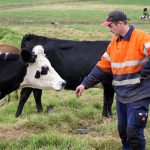
Associate Agriculture Minister Meka Whaitiri announced at Fieldays in Mystery Creek near Hamilton that the Government would invest $8.98m over seven years to expand the plantain programme through the Ministry for Primary Industries’ Sustainable Food and Fibre Futures fund.
DairyNZ, PGG Wrightson Seeds and Fonterra Co-operative Group are collectively investing $10.47m in cash and $2.8m in kind in the programme.
The programme aims to reduce nitrate leaching from dairy farms into freshwater using the herb plantain, which farmers can sow as part of their pasture, alongside grass and clover, or on its own.
“Farmers have been under increasing pressure for some time now to manage their environmental footprint, and those pressures are not only driven by Government regulation but by customers and consumer expectations, but also a drive from farmers themselves,” said DairyNZ chief executive Dr Tim Mackle.
”We are committed to reducing our environmental footprint, now and in the long run. If we are going to be successful in rising to this challenge, we have got to continue to invest in tools for farmers that help us to reduce our footprint while remaining profitable and viable,” Mackle said.
“This programme is very exciting and is geared at delivering many positive outcomes for farmers, the environment and New Zealand’s economy.”
Modelling by DairyNZ forecasts a potential reduction of 15,000 tonnes per year of nitrate-nitrogen leached on 4200 New Zealand dairy farms in nitrogen-sensitive catchments per year by 2035. That is a 37 percent reduction from current levels.
“The benefits are obviously enormous for the environment,” Whaitiri said. “This programme is expected to demonstrate plantain’s efficiency at scale so farmers have the confidence they need to invest in pasture and practice change.”
Plantain use is expected to save farmers more than $1 billion per decade, when compared to other high-cost solutions.
The programme will focus on proving plantain’s effectiveness at reducing nitrate leaching, investigating regional effects and protecting the supply chain.
It will include large-scale farm systems experiments at Lincoln and Massey Universities. If proven successful, the industry partners will work with farmers to help them adopt plantain as an animal feed on their farms.
Since the Sustainable Food & Fibre Futures fund was set up in October 2018, the Ministry has approved 138 projects and invested $111m, with a further $138m of investment from industry and community groups.
The fund invests in projects and businesses the Ministry expects to deliver long-term environmental, social, economic, and cultural benefits. The plantain programme is one of its largest investments so far.

























